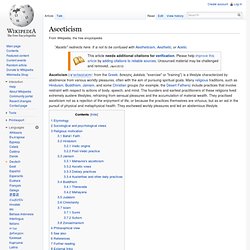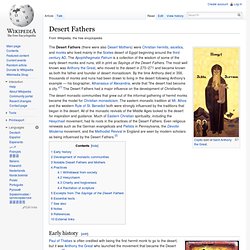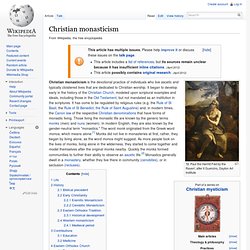

Asceticism. Asceticism (/əˈsɛtɪsɪz(ə)m/; from the Greek: ἄσκησις áskēsis, "exercise" or "training") is a lifestyle characterized by abstinence from various worldly pleasures, often with the aim of pursuing spiritual goals.

Many religious traditions, such as Hinduism, Buddhism, Jainism, and some Christian groups (for example, the Desert Fathers) include practices that involve restraint with respect to actions of body, speech, and mind. The founders and earliest practitioners of these religions lived extremely austere lifestyles, refraining from sensual pleasures and the accumulation of material wealth. They practised asceticism not as a rejection of the enjoyment of life, or because the practices themselves are virtuous, but as an aid in the pursuit of physical and metaphysical health. Desert Fathers. The Desert Fathers (there were also Desert Mothers) were Christian hermits, ascetics, and monks who lived mainly in the Scetes desert of Egypt beginning around the third century AD.

The Apophthegmata Patrum is a collection of the wisdom of some of the early desert monks and nuns, still in print as Sayings of the Desert Fathers. The most well known was Anthony the Great, who moved to the desert in 270–271 and became known as both the father and founder of desert monasticism. By the time Anthony died in 356, thousands of monks and nuns had been drawn to living in the desert following Anthony's example — his biographer, Athanasius of Alexandria, wrote that "the desert had become a city. Christian monasticism. 'St.

Paul the Hermit Fed by the Raven', after Il Guercino, Dayton Art Institute Christian monasticism is the devotional practice of individuals who live ascetic and typically cloistered lives that are dedicated to Christian worship.